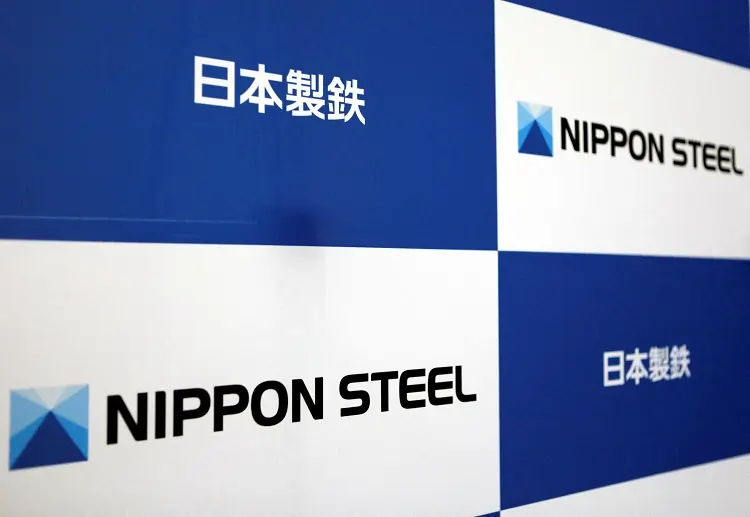
By Noriyuki Hirata, Yuka Obayashi and Katya Golubkova
TOKYO (Reuters) -Japan’s Nippon Steel may need to look at a revamp of its growth strategy after U.S. President Joe Biden blocked its proposed $14.9 billion acquisition of U.S. Steel, but its share price could bounce back in the near-term, analysts said.
Shares in Nippon Steel fell only slightly on Monday in their first trading since Biden on Friday rejected the deal after a year-long review, citing national security concerns.
Biden’s opposition to the deal had been well-flagged and U.S. Steel shares had been trading far below the offer price as a result. Nevertheless, Japan’s largest business lobby said the decision was a cause for concern regarding future U.S. investment.
Nippon Steel shares closed down 0.75% at 3,158 yen ($20.03) on Monday, compared with a 1% fall in broader Topix index. They settled at 3,182 yen on Dec. 30, the final trading day of 2024 on the Tokyo Stock Exchange, which was closed for the remainder of last week for the New Year holiday.
“Some investors may view the failure of the U.S. Steel acquisition as alleviating financial concerns due to the substantial amount of money involved in the deal,” said Yoshihiko Tabei, chief strategist at Naito Securities.
Nippon Steel had not finalised a permanent financing plan for the all-cash deal but said raising equity was among the possibilities.
Tabei, however, noted that uncertainty remains, as achieving medium- to long-term growth will likely be challenging without expanding operations in the U.S.
With U.S. Steel, Nippon Steel aimed to raise its global crude steel production capacity to 85 million metric tons per year from 65 million tons now, nearing its long-term goal of lifting production capacity to 100 million tons.
The proposed deal has not yet been terminated by the companies even after Biden blocked the purchase.
In a joint statement, Nippon Steel and U.S. Steel called Biden’s decision “unlawful” and said they will take all appropriate action to protect their legal rights.
Nippon Steel will owe U.S. Steel a $565 million break fee if it is not completed.
Still, some analysts think the failure of the deal could boost shares in Nippon Steel.
“Even if the deal does not proceed, Nippon Steel’s earnings outlook remains unchanged, with significant growth expected in the next financial year starting in April,” Yuji Matsumoto, an analyst at Nomura Securities said in a note.
“Additionally, the removal of financing uncertainty related to the acquisition is likely to support a near-term increase in the stock price,” he said.
POTENTIAL LEGAL ACTION
Japan is the biggest investor into the U.S. economy and some business leaders and officials have voiced a concern that the deal’s failure may cool down investment flow from the country.
Prime Minister Shigeru Ishiba said on Monday that he viewed Biden’s decision as a “grave matter” that has led to concerns among Japanese businesses over the future of bilateral investment.
“We will strongly request the U.S. government to dash such concerns,” he said. “Although (the U.S.) is an allied nation, for the future of our relations, we must insist on an explanation as to why there are security concerns.”
The government has already conveyed its position to the Biden administration and will consider concrete support measures for Nippon Steel based on the company’s response to the decision, Japanese industry minister Yoji Muto said on Monday.
Keidanren, the Japanese business lobby, echoed the government’s response, adding Biden’s decision to block the deal was “extremely disappointing”.
“Despite the fact that Japan is the U.S.’s largest investor and ally, the decision, which was made on the grounds of economic security, is a cause for concern about the impact on future investment in the U.S. and on Japan-U.S. economic relations,” the organisation said in a statement.
For both companies, the path forward is unclear.
Nippon Steel and U.S. Steel could sue the U.S. government, another buyer could swoop in for U.S. Steel, or Republicans who favour the deal could urge President-elect Donald Trump to find a way to approve it.
But some lawyers and consultants have said a legal challenge would be tough.
“Even if Nippon Steel is somehow able to resuscitate the deal, it faces a similarly dire prognosis from Trump. He would probably move quickly to kill it,” said David Boling, a director at consultants Eurasia Group.
On Monday, Nippon Steel President Tadashi Imai told reporters filing a lawsuit against the U.S. government is one of the “important options”, Nippon Television reported.
Imai said that the U.S. government’s reviewing process and the decisions over its acquisition proposal did not seem properly handled, adding Nippon Steel is “entitled to a proper review,” according to the report.
Imai said that it would not take long for the company to announce countermeasures to the U.S. government’s decision, the report said.
($1 = 157.6300 yen)
(Reporting by Mariko Katsumura, Noriyuki Hirata, Yuka Obayashi, Katya Golubkova and Chang-Ran Kim; Editing by Jamie Freed and Christian Schmollinger, Kirsten Donovan)


